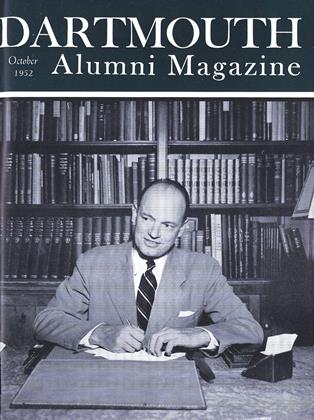The following books about party politics, the candidates and some of the issues involved in the 1952 Presidential campaign are suggested by Profs. Robert K. Carr '29 and John W. Masland of Dartmouth's department of government.
THE FUTURE OF AMERICAN POLITICS. Samuel Lubell (Harper). A recent book that analyzes thoroughly and persuasively the reasons for Democratic strength and Republican weakness at the ballot box since 1928. This volume has attracted much favorable attention and is perhaps the best available study of political alignments and the changing tides of politics.
PARTY AND PRESSURE POLITICS. Dayton D. McKean (Houghton Mifflin). One of the best of the textbooks dealing with parties and politics, written by a former member of the Dartmouth faculty.
THE POLITICS OF DEMOCRACY. E. Pendleton Herring (Rinehart). A series of essays by the current president of the American Political Science Association advancing the point of view that our American political parties are properly agencies of compromise rather than staunch defenders of principle.
PARTY GOVERNMENT. E. E. Schattschneider (Rinehart). Professor Schattschneider of Wesleyan University is a leading exponent of the thesis that the Republican and Democratic parties should take sharper stands on the issues and provide'the voters with more meaningful choices.
CONGRESS ON TRIAL. James M. Burns (Harper). Professor Burns of Williams advocates a greater measure of party centralization and discipline so that campaign promises may be more faithfully carried out by the party that winsan election.
CONGRESS: CORRUPTION AND COMPROMISE. H. H. Wilson (Rinehart). Professor Wilson of Princeton describes the seamier side of Congress and reveals that corruption is not centered exclusively in the executive branch of government.
MORALITY IN AMERICAN POLITICS. George A. Graham (Random House). Mr. Graham, professor of politics at Princeton, analyzes ethical standards in government and the good and bad influences of parties, lobbies, pressure groups and the public on politics and politicians.
MASTER PLAN U.S.A. John Fischer (Harper). A popular discussion of the aims of the present Administration's foreign policy.
THE AMERICAN RECORD IN THEFAR EAST. Kenneth Scott Latourette (Macmillan). This is a well-balanced evaluation of American far eastern policies in the critical postwar years, by one of the leading scholars in the field.
AMERICAN DIPLOMACY 1900-1950. George F. Kennan (University of Chicago). In this series of lectures delivered at the University of Chicago, Kennan, presently U. S. Ambassador to the Soviet Union, tries to evaluate the basic concepts underlying the conduct of American foreign relations.
AMERICAN CAPITALISM: The Concept of Countervailing Power. John K. Galbraith (Houghton Mifflin). An optimistic report on the state of the American economy, by a Harvard economist and former government official.
ECONOMY IN THE NATIONAL GOVERNMENT. Paul Douglas (University of Chicago). The Federal budget is analyzed by the Senator from Illinois. A TWO-PARTY SOUTH? Alexander Heard (University of North Carolina). A book dealing with the past, present and probable future of party politics in the South.
Campaign Biographies
EISENHOWER: THE MAN AND THESYMBOL. John Gunther (Harper).
WHAT EISENHOWER THINKS. Edited by Allan Taylor (Crowell).
MAN FROM ABILENE. Kevin McCann (Doubleday).
ADLAI E. STEVENSON OF ILLINOIS.
Noel Busch (Farrar, Straus and Young). ADLAI STEVENSON. John B. Martin (Harper).
 View Full Issue
View Full Issue
More From This Issue
-
 Article
ArticleDaniel Webster's College Days
October 1952 By EDWARD CONNERY LATHEM '51 -
 Article
ArticleThe New Dean . . .
October 1952 By JOHN HURD '21 -
 Article
ArticleDartmouth Men Active In the Big '52 Fight
October 1952 By C. E. W. -
 Class Notes
Class Notes1918
October 1952 By ERNEST H. EARLEY -
 Class Notes
Class Notes1905
October 1952 By GEORGE W. PUTNAM, GILBERT H. FALL -
 Class Notes
Class Notes1948
October 1952 By FRANCIS R. DRURY JR., ROBERT L. MERRIAM
Article
-
 Article
ArticleDARTMOUTH'S MILITARY POLICY
April 1917 -
 Article
ArticleCHENEY '20 .RECEIVES COFFIN FELLOWSHIP A SECOND TIME
August, 1925 -
 Article
ArticleTHOUSANDS OF BRICKS AROUND NEW LIBRARY SITE
MARCH, 1927 -
 Article
ArticleTri-College Forum
April 1939 -
 Article
ArticleNew Members of Alumni Council
November 1961 -
 Article
ArticleTuck School
OCTOBER 1962 By George Drowne D’33

